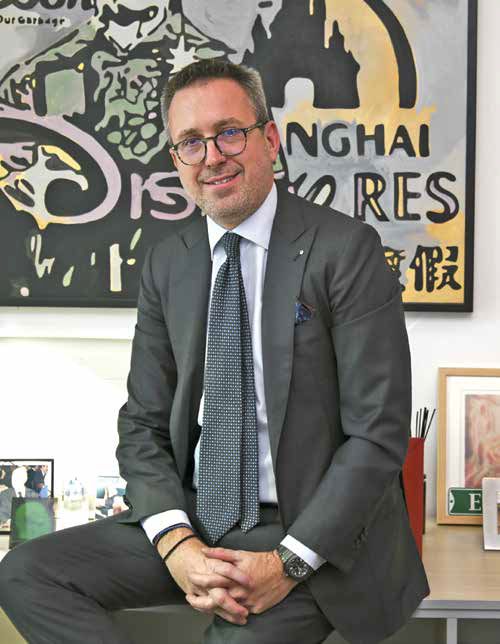A side from the continuous efforts to further the successful positioning of the association and the activities related
to as efficient as possible cooperation between Italian and Serbian economy, the focus of Confindustria’s activities in the upcoming period will be on long-term plans that will leave a significant mark primarily in the field of bolstering the cooperation between the educational system and businesses in Serbia and investing in the youth, as well as focusing on production and management digitalisation.

From your standpoint, what are the implications of European integrations of Serbia and the strong cooperation with China, especially in construction of infrastructure, and what does the positioning of Serbia on the “One Belt, One Road” map mean to foreign investors in a logistics sense?
— Serbia’s integration into the EU and Serbia being included in China’s One Belt, One Road project are complementary issues and as such, they do not exclude one another. Serbia’s accession to the EU community
carries certain benefits because the European Union is one customs union and one customs zone. On the other hand, Serbia being positioned on the map of the Chinese One Belt, One Road project is very significant, even more since this entails the arrival of major Chinese companies that bring numerous advantages with them, from the know-how,
new methodologies and manners of work, to creation of new jobs. China became a superpower a long time ago, and it is no longer a country of cheap production, but a country known for state of the art technological products. The One Belt, One Road initiative has strategic relevance to Serbia, not only in terms of arrival of companies, but also from the aspect of infrastructure development in Serbia, roads, railways, etc. Serbia has such a position, and both development paths will bring great benefits for Serbia, considering the central role the country currently plays in the region.
Considering your expertise in logistics, what would you advise to the Serbian Government when it comes to further development of communications and transport & logistics sector?
— Belgrade has a great position – it has the River Danube, Serbia is part of the Corridor 10, it has a developed road and railroad infrastructure, motorways are being built, as well as railways, there are investments in roads. All these are preconditions necessary for opening a logistics facility in Belgrade. My suggestion to the Government of the
Republic of Serbia would be that Belgrade should have a big logistics centre, which would attract major foreign companies. Today, e-commerce is the future of trade, and a completely new direction of development of this activity
that takes precedence. On the other hand, large Chinese companies are global leaders and they are at the very top of this industry. I am quite certain that by opening a major logistics centre, Belgrade would manage to attract the companies I’m talking about, namely large global Chinese companies, like Alibaba , which would bring new investments to Serbia and would contribute to further development of Serbian economy.
How attractive are the trade agreements that Serbia has with Russia, Turkey and some other countries, for your members? Did you calculate the effects of that Serbia’s possible entry into the EU and the revision of some of these agreements would have?
— It is certain that by joining the EU, Serbia will be in a situation where these agreements would have to be reviewed. Also the agreements with Russia will certainly be revised. Something similar happened to other
countries when they became EU members, and that is inevitable. These agreements are relevant to Serbia and they brought benefits to Serbia at one point, but I think that by joining the EU, Serbia will have to re-evaluate the agreements it has and these agreements will have to be revised, which entails certain consequences . It is also important to note that EU membership brings many benefits for the local economy and for the foreign investors – a clearly defined and harmonized legal framework, for example, is a very important feature to have predictability regarding business operations and for their further development. We also think that the perspective of entry into the EU and the inevitable review of the free trade agreements must only serve as an incentive for this country’s Government and for the economy, as well as to focus on new competitive advantages, where they have to put education and additional education in first place, and construction of adequate infrastructure.

Confindustria Serbia is a young association, which has a strong focus on young people. What i experiences do your members have regarding the young workforce from Serbia?
— The “Year of Open Doors to Italian Industry” project, which was envisioned and implemented by Confindustria
in cooperation with our partners – Manpower Group Serbia and Energia Gas and Power, under the auspices of the Italian Embassy in Belgrade, was initiated as a pilot project in November 2016, but it has had a new format since 2017. We are very proud of the fact that we are a part of the large and significant process called “Dual Education
in Serbia” through this project, and that, by offering our ideas and being willing to invest effort, we managed not only to enable the young people, who finished their schooling, to get a job, but also, in cooperation with the Ministry of Education, to adapt educational programmes in schools in Vršac, Zrenjanin, Sremska Mitrovica, Velika Plana, etc.
You know, Italian companies, which operate across Serbia, opened their doors to young people, allowing them to familiarize themselves with the processes and the manner of work, how technologies and knowledge are applied, in addition to seeing what companies use in their production process while they were still in school. Young people are the most valuable resource that our county has, and both the economy and the entrepreneurs must invest in talent and bring the business culture and the entrepreneurship spirit closer to young people. In relation to this, we implemented the last stage of the “Year of Open Doors to Italian Industry” project in Belgrade last year, in the
form of job fair put together by our member-companies.
Italian investments are very often connected with work-intense branches, such as the textile industry. However, you are also involved in conferences about digital industry, digital economy and advance technologies. What potential is there for connecting the Italian and Serbian economies?
— Bocconi developed a programme in cooperation with MIT from Boston, called DEVO Lab, where digital skills
are not communicated in a dull manner, but with managerial skills. Companies have to know how to estimate at which point and which degree of digitalization to introduce into their production, and in that sense Bocconi and MIT offered their expertise as partners not only to science and technology parks in Serbia , but also to certain companies,
as well as to institutions and the state. In this way, we are trying to apply the existing know-how and better introduce
technology and application of digital technologies in companies in Serbia, with the intention to underline that digitalization is necessary for everything, but on the other hand, not every product and every industry require the same degree of digitalization at all times. This is precisely the wider concept and the manner in which we connect Italy’s experiences with Serbia . It is important for me to point out that in that sense, digitalization is not the only way for work-intensive industries to adapt in the 21st century. For a decade already, companies from the textile or shoe industry in Italy, for example, use their own waste and leftovers from manufacture as a resource. Circular
economy was initiated in Italy, precisely in these work-intense sectors, which became a European leader in this aspect. Confindustria deeply believes in this principle, and it wants to transfer this economic model to Serbia
as well. We are making an effort in that direction, and we will organize the first conference at the end of November on the topic of circular economy in Serbia, with full support from the local ministry and the Italian Embassy.
For three years in a row, Confindustria Serbia has been organizing events covering topics related to IT industry and digitalization. The first one was dedicated to start-up and establishment of a business environment that sustains start-ups. We organized the second one in the presence of Bocconi at the Zvezdara Science and Technology Park, where possibilities and challenges that digitalization offers for traditional industries such as production or sales
were presented. A proposal for establishing cooperation with the Serbian Government was made and we are still negotiating with them. We will hold a conference on the topic of cyber security and its application in the finance and telecommunications sectors on November 8th this year, at the Belgrade City Assembly, which once again proved to be an extraordinary partner. The conference will gather experts from the region, Serbia, Israel , and Australia.
The value of external trade between Italy and Serbia amounts to almost €4 billion. Is that near the estimated maximum, considering the range of investments and the size of Italian investment companies, or is there more potential for expansion of the volume of work of companies that are already present on the market?
— Next year, Italy and Serbia will celebrate 140 years of diplomatic cooperation and 10 years of partnership. Italy has always been here. Not only that we didn’t reach the maximum, but Serbia is just entering the new investment cycles. Italy is Serbia’s most important export destination, and Italian export posted a growth in 2017, and this trend continues. As the Italian economy transforms in Italy, its investments abroad adapt to this: sectors where investments are made are changing, conditions of partnerships with local companies change as well. For example,
Serbia has been a “laboratory” for many foreign companies for a long time already, where they aren’t only looking for work force, but where these companies are developing new products and technologies. Even more so since Serbia is the key political factor in the region, engaged in promotion of peace and stability, and the current government of Ana Brnabić, and previous ernments led by the current President of the State, Aleksandar Vučić, are proof of that. You know, politics is inseparable from the economy in Serbia, because politics is what creates the economic environment and it’s certain that investors who know that they have to talk with these same people in the years to
come, feel secure, and that is an advantage. On the other hand, both I and Ambassador Lo Cascio are veterans in Serbia, and great experts regarding the situation in the Balkans and in Serbia. This environment feels like home for us, and we are putting effort, each in hisown domain, into enabling the Italian businessmen to invest and to solve problems. We are offering positive examples, which is a positive signal for investors to invest here. Italy, on the other hand, is a different country, we changed 65 governments in 60 years and this doesn’t affect the economy. Serbia is a country where political environment is an important creator of a safe economic environment. The efforts that this government invested have contributed that Serbia today is regarded as a safe environment with good economic climate for investments, and Serbia, as the centre of this region, is yet to move forward . We, the “veterans” and Confindustria, have one goal when it comes to influx of Italian investments, and that is for the companies that come and stay here.
Out of more than 25,000 people employed by Italian companies, almost 12,000 are in Vojvodina. Which parts of Serbia can we single out as those towards which Italian companies gravitate the most?
— Italian businessmen invest anywhere, from Subotica to Vranje, and if you have noticed, we are not investing only in Vojvodina, Italian companies are evenly distributed all over Serbia and they truly invest in development and work forces, but also in the environments where they have their production plants. Let me just state an example that Confindustria Serbia which has its branch in Subotica, and all the companies and investors on the territory of Vojvodina can contact our representative there for all questions and issues they are facing. Italian companies are an example of regional operations, and they are also an example of decentralization to which all countries, including Serbia , strive. For Confindustria, presence on the territory is a very important matter: we believe that, as an association, we have to be with the businessmen and at the plants. By looking towards the future, our goal is to be organized in all the cities in Serbia, just like we are organized in Italy. I hope that we will soon have a representative for Central and South Serbia as well, these are the regions that are yet to expect an inflow of foreign investments, where construction of the highway will play a central role.

You recently said that Confindustria Serbia, with its 160 member- companies, is the best example of cross-border cooperation, not only between Serbia and Italy, but also on the regional level, so with Bulgaria, Romania, Macedonia and Montenegro. What is the potential of such cooperation, and in which industries is it especially productive?
— Even though it was established 6 years ago in Serbia, Confindustria made gigantic steps in a short period, as seen in numerous activities and results : from seminars on changes in legal frameworks, to themed conferences; from operational support of companies to monitoring of new investors. I keep reiterating that regional cooperation is very important, and that it bears great potential, because all the West Balkan countries are a natural partner to EU; they strive and move towards membership in the EU. Currently, Serbia has the biggest external trade with the EU countries and the EU is the most important trade partner of all the countries in the Balkans . When it comes to the cross border cooperation, the fact that Confindustria has offices in all the countries of the region only facilitates our contacts with the neighbouring countries. I would say that cooperation in the field of human resources has become among the most important ones, while there are numerous companies in all the industries that operate in Serbia, as well as in Romania or Bulgaria. Today, borders between economy and business are increasingly less visible, and we as Confindustria must know, notice and support this in an adequate manner.